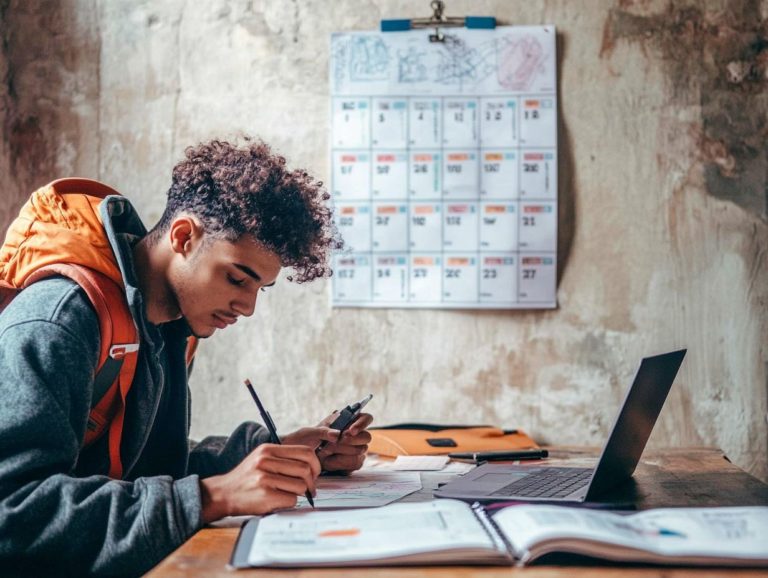5 Steps to Enhance Your Language Learning Experience
Unlocking the world of language learning is a journey filled with excitement and challenges. Whether you re just starting or refining your skills, setting realistic goals and immersing yourself in the language are crucial steps that will enhance your experience.
This article explores effective strategies to elevate your learning, address common hurdles, and keep you motivated. Discover the benefits of mastering a second language and uncover the finest resources to support your success.
Don t miss out! Seize this chance to transform your language journey today!
Contents
- Key Takeaways:
- 1. Set Realistic Goals
- 2. Immerse Yourself in the Language
- 3. Practice Regularly
- 4. Use Various Learning Methods
- 5. Seek Feedback and Guidance
- Why Is Language Learning Important?
- Frequently Asked Questions
- 1. What are the 5 steps to enhance my language learning experience?
- 2. How do I set clear goals for my language learning journey?
- 3. Can you suggest a study plan for language learning?
- 4. How important is daily practice in language learning?
- 5. What does immersing myself in the language mean?
- 6. How can getting feedback from native speakers enhance my language learning experience?
Key Takeaways:

- Set achievable goals to boost motivation and focus.
- Immerse yourself! Surround yourself with native speakers and media.
- Practice consistently to master new language skills.
1. Set Realistic Goals
Setting realistic goals is essential for your language journey. It keeps you motivated and helps you focus on specific skills.
For instance, a short-term goal could be completing a number of vocabulary words each week, while a long-term objective might be achieving fluency within a year. These measurable milestones act as benchmarks you can adjust as you progress.
Recognizing the personal benefits of mastering a new language like boosting career prospects or enabling travel can significantly elevate your motivation to overcome challenges. This tailored approach fosters accountability and makes your language journey more meaningful.
2. Immerse Yourself in the Language
Immersing yourself in the language is one of the most effective ways to enhance your learning experience. This exposure provides insight into cultural nuances through music, podcasts, movies, and conversations with native speakers, as highlighted in 5 tips for learning a language while traveling.
These enriching mediums, along with visual aids like flashcards and language apps, can enhance your comprehension and retention. Additionally, consider utilizing 5 tips for learning a language with a busy schedule. Engaging in local cultural events or language meetups not only refines your conversational skills but also deepens your understanding of the language context.
To integrate these experiences into your daily routine, set aside specific times for practice. Engaging with the language on social media or planning trips that allow you to immerse yourself in the native environment can greatly enhance your understanding. Additionally, exploring 5 ways to enhance your cultural awareness can further enrich your journey. The cumulative effect of these activities will lead to improved fluency and a more authentic grasp of the language.
3. Practice Regularly
Regular practice is crucial for mastering a language, as it solidifies your skills and helps you navigate mistakes while honing your listening and speaking abilities.
Diversifying your practice can significantly boost your fluency. Having conversations with native speakers sharpens your pronunciation and provides invaluable real-time feedback.
Language exchange platforms offer unique opportunities to connect with fluent individuals, creating a collaborative learning environment. Integrating dedicated time for focused study through reading, writing, or exercises is essential.
By emphasizing consistency, you maintain momentum, while allowing for flexibility ensures you can adapt to varying schedules. This approach guarantees a comprehensive and effective language acquisition experience.
4. Use Various Learning Methods

Using different learning methods can significantly improve your language acquisition. This allows you to find effective strategies that fit your unique learning style.
Online platforms like Duolingo, Rosetta Stone, and Memrise offer interactive lessons that cater to various preferences. This makes language practice both fun and convenient.
Traditional language classes provide structured environments that encourage real-time communication and valuable feedback. You can also use audiobooks to hear native pronunciation, while visual aids like flashcards help with vocabulary retention.
Engaging multimedia resources, such as TED Talks, expose you to real language use, cultural nuances, and different accents. This enriches your overall understanding and fluency.
5. Seek Feedback and Guidance
Getting feedback from native speakers or language instructors provides invaluable insights. This feedback can accelerate your language learning through helpful suggestions and encouragement.
Participating in community events and language exchange meetups is a great way to connect with people who can offer personalized advice. Approaching native speakers might feel daunting, but a simple greeting or sharing your eagerness to learn can lead to meaningful conversations.
These informal settings build authentic connections and create an environment for real-time feedback. Combining this with evaluations from instructors will help refine your language skills, making the learning process enjoyable and effective.
Why Is Language Learning Important?
Don’t miss out on the essential skill of language learning! It opens doors to new cultures and experiences while providing numerous personal benefits.
Mastering a new language can significantly boost your job prospects. Employers increasingly value candidates who can communicate across borders. Those who study abroad often report that their experiences help them build fluency and navigate complex social interactions easily.
Learning a language deepens your appreciation for cultural nuances. It allows you to connect meaningfully with traditions and practices that are different from your own. This journey can skyrocket your professional growth through invaluable networking, while also enriching personal relationships and fostering empathy in our interconnected world.
What Are the Benefits of Learning a Second Language?
Learning a second language offers a range of benefits, including enhanced thinking skills, improved cultural understanding, and expanded personal and professional opportunities.
Research shows that individuals who speak multiple languages often have better memory retention and refined problem-solving skills. This helps them tackle challenges from different angles. Immersing yourself in a new language fosters a deeper appreciation for diverse cultures, enhancing your enriched worldview.
In today s interconnected world, where globalization reigns supreme, being bilingual gives you a competitive edge in the job market. Employers seek candidates who can navigate diverse environments and communicate effectively across cultural boundaries. Thus, multilingualism is a valuable asset for anyone aiming to advance their career.
What Are the Common Challenges in Language Learning?

Common challenges in language learning can significantly impede your progress. These include inevitable mistakes, the struggle to maintain motivation, and the complexities that come with immersing yourself in a new language and culture.
For many learners, the fear of embarrassment when speaking can loom large. This acts as a formidable barrier that prevents you from practicing and refining your skills. The initial thrill of progress may start to fade over time, leading to dips in engagement and interest.
To overcome these hurdles, embracing a supportive community can prove invaluable. Participating in group language exchanges or engaging in online forums allows you to share experiences and gather helpful tips from others on a similar journey.
Real-life experiences, such as watching films, attending cultural events, or even traveling, can reignite your motivation and provide authentic contexts for practice. This makes learning exciting and engaging, transforming your journey from merely memorizing grammar (the rules of language structure) and vocabulary into a rich tapestry of connection and discovery.
How Can One Stay Motivated in Language Learning?
Staying motivated in language learning is essential for your success. Discovering enjoyable ways to engage with the language can help you maintain enthusiasm and commitment throughout your journey.
One effective strategy is to set achievable goals that allow for gradual progress. This makes each milestone feel truly rewarding. Celebrate those victories, no matter how small they may seem, to reinforce that sense of accomplishment.
Immersing yourself in community events where your target language is spoken can significantly enhance your learning experience. To further enrich your journey, you can explore how to make the most of language learning events, along with indulging in delightful activities like watching movies and listening to music.
These enjoyable pastimes not only provide valuable context for the language but also foster positive associations. This makes it easier for you to stay committed and inspired along the way.
What Are the Best Resources for Language Learning?
The finest resources for language learning span an array of online platforms, audiobooks, language classes, and multimedia tools. These cater to your unique learning preferences.
Among the most popular choices are platforms like Duolingo, Babbel, and Memrise. Each offers distinctive features that transform language acquisition into an enjoyable and effective journey. You will find yourself engaging with interactive exercises and gamified lessons specifically designed to reinforce both vocabulary and grammar.
Beyond online resources, audiobooks provide an exceptional opportunity for immersive learning. They enable you to absorb the nuances of pronunciation and sentence structure while effortlessly multitasking. Enrolling in language classes offers structured guidance from experienced instructors, helping clarify concepts and enhancing your speaking skills.
When selecting the right resources, consider your personal learning style and specific goals be it conversational fluency, academic proficiency, or professional communication.
How Can One Overcome Language Learning Plateaus?
Overcoming language learning plateaus demands consistent effort, innovative study methods, and a willingness to seek feedback. This can help reignite your progress and deepen your understanding.
Recognizing when you ve hit a plateau can be tricky. Telltale signs often include a slowdown in speaking fluency, a dip in enthusiasm, or struggling to absorb new vocabulary. To combat this stagnation, consider shaking up your study routines. This could mean incorporating a variety of materials or alternating between intensive reading and conversational practice.
Diving into new resources, like podcasts, films, or online courses, can offer fresh perspectives and maintain your motivation. Participating in language exchange programs provides an engaging platform for real-world practice. This allows you to connect with native speakers while sharing cultural insights, ultimately fostering a more dynamic and enriching learning experience.
Frequently Asked Questions

1. What are the 5 steps to enhance my language learning experience?
To enhance your language learning, follow these five steps: set clear goals, create a study plan, practice daily, immerse yourself in the language, and get feedback from native speakers.
2. How do I set clear goals for my language learning journey?
Ask yourself why you want to learn the language. Decide how fluent you want to be and by when to stay motivated.
3. Can you suggest a study plan for language learning?
Your study plan should mix reading, writing, listening, and speaking.
Include regular reviews and challenge yourself with new material.
4. How important is daily practice in language learning?
Daily practice is essential. It reinforces what you ve learned and strengthens your skills over time.
5. What does immersing myself in the language mean?
Dive into the language by using it in real-life situations.
Watch movies, chat with native speakers, or visit a country where the language is spoken.
6. How can getting feedback from native speakers enhance my language learning experience?
Feedback from native speakers helps you spot areas for improvement.
It also allows you to practice speaking and gain insights into the language and culture.



